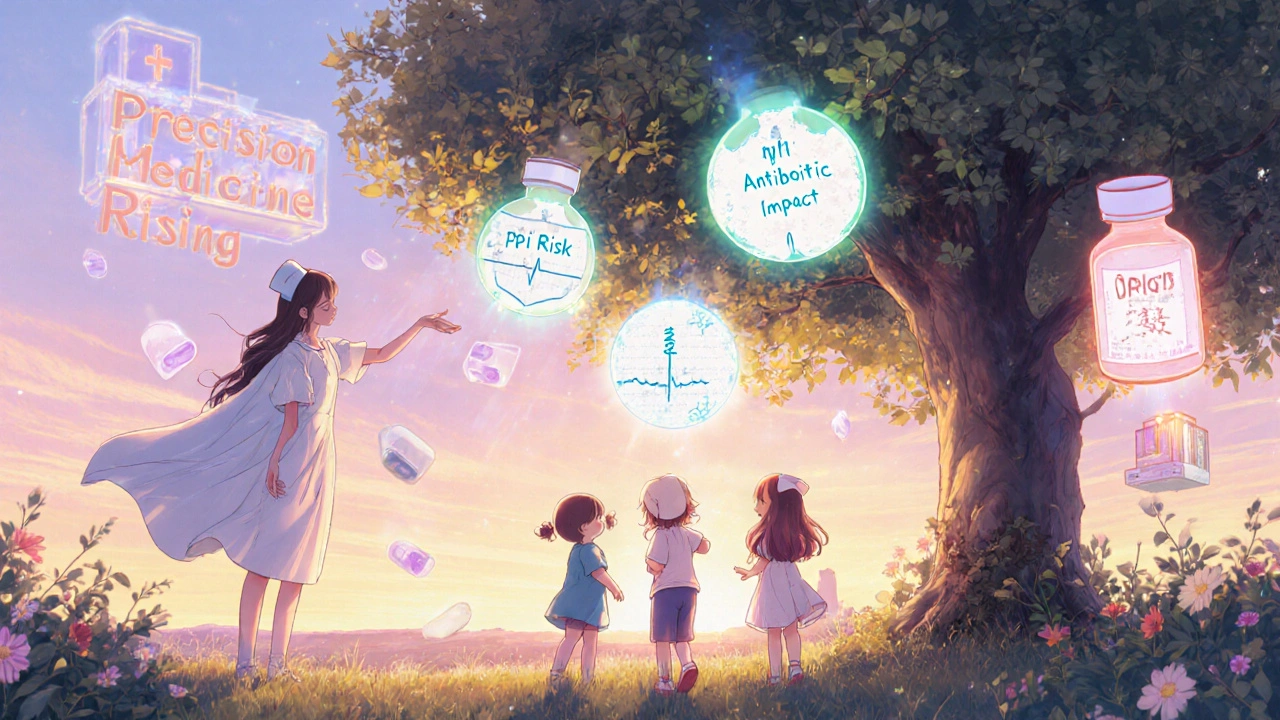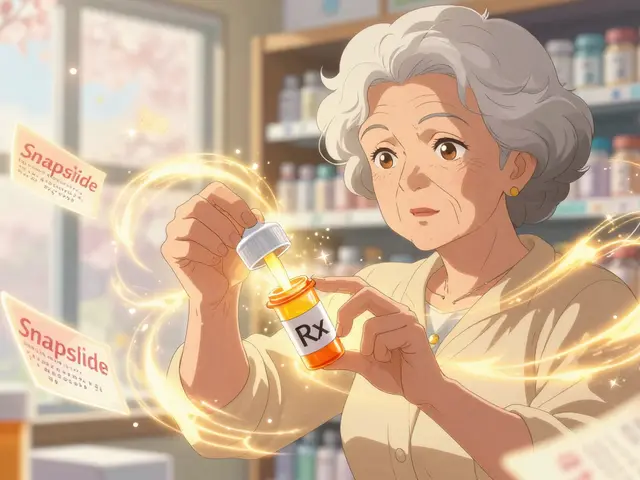Preterm Infant Medication Dosing Calculator
Medication Dosing Calculator
Calculate adjusted medication doses for preterm infants based on gestational age and birth weight. Input values to see recommended doses and potential side effect risks.
Adjusted Dose & Risk Assessment
Click Calculate to view resultsEnter gestational age, birth weight, and select a medication to see adjusted dose and risk information.
When a baby is born too soon, every decision matters-even the smallest dose of medicine. Preterm infants, born before 37 weeks, don’t just need extra care-they need medications that are carefully matched to their tiny, still-developing bodies. But here’s the hard truth: most drugs given in the NICU weren’t designed for them. And the side effects? They can last far longer than the hospital stay.
Why Preterm Infants Are So Sensitive to Medications
A preterm baby’s liver, kidneys, and brain are still under construction. Their ability to absorb, break down, and get rid of drugs is nothing like a full-term infant’s, let alone an adult’s. At 28 weeks, a baby’s cytochrome P450 enzymes-responsible for metabolizing over 70% of medications-are only at 30% of adult function. They won’t reach full maturity until the child is a year old. That means a drug that clears quickly in a 1-year-old can build up dangerously in a 29-week-old preemie. Add to that the fact that many preterm infants have conditions like patent ductus arteriosus (PDA), which changes how drugs spread through their bodies. One study found that PDA can increase the volume of distribution for certain medications by up to 80%. That’s not a small tweak-it’s a complete shift in how the drug behaves. Without adjusting for this, you’re not just underdosing or overdosing-you’re flying blind.The Most Common NICU Medications and Their Hidden Risks
Let’s look at the drugs you’ll see in nearly every NICU-and what they’re really doing to these tiny patients.- Caffeine citrate is the go-to for apnea of prematurity. It works. But 18.7% of babies on standard doses develop tachycardia. Another 7.3% can’t feed properly because of stomach irritation. Dose adjustments aren’t optional-they’re necessary.
- Opioids and benzodiazepines are used to manage pain and sedate babies during procedures. Yet a 2021 JAMA study found that 100% of extremely preterm infants received at least one of these drugs during their NICU stay. That’s not rare-it’s standard. But we now know these drugs can interfere with brain development. The AAP now advises against routine use, yet many units still default to them.
- Antibiotics are given to nearly half of preterm infants, often for suspected sepsis that never gets confirmed. But research shows these babies end up with gut microbiomes packed with 47% more harmful bacteria and 32% fewer good ones. These changes don’t fix themselves. They can persist for years, increasing risks for infections, allergies, and even obesity later in life.
- Proton pump inhibitors (PPIs), used to treat reflux, are prescribed to 41% of NICU graduates. But they come with a steep cost: 1.67 times higher risk of necrotizing enterocolitis (NEC), 1.89 times higher risk of late-onset sepsis, and 2.3 times higher fracture risk. The 2022 Cochrane review found no real benefit. And yet, they’re still widely used.
- Magnesium sulfate, given to moms before preterm birth to protect the baby’s brain, reduces cerebral palsy risk by 30%. But in infants under 26 weeks, it’s linked to a 2.4-fold increase in meconium-related ileus-a dangerous bowel blockage.
Off-Label Use Is the Norm, Not the Exception
Only 35% of medications used in NICUs have FDA approval for infants. For respiratory drugs? That number drops to 8%-meaning 92% are prescribed off-label. That doesn’t mean they’re unsafe. It means we’re guessing. Doctors and pharmacists rely on outdated formulas, adult dosing scaled down, or small studies with limited data. One NICU pharmacist reported that 76.3% of medication protocols need to be adjusted based on gestational age. A 28-week baby isn’t just a smaller 36-week baby. Their metabolism, fluid balance, and organ function are fundamentally different. Yet most hospitals still use weight-based dosing alone, ignoring the critical role of gestational age.
Medication Errors Are More Common Than You Think
Nurses in NICUs report that 68.4% see at least one medication error per month. Most are due to miscalculating weight-based doses-sometimes by just a few milligrams. In a baby weighing 800 grams, that’s enough to cause a seizure, a dangerous drop in blood pressure, or cardiac arrest. One parent shared on a support forum: “My son got 28 days of antibiotics for suspected sepsis that was never confirmed. Now, at age 2, he’s had five ear infections and two rounds of antibiotics.” That’s not an isolated story. It’s a pattern. Early antibiotic exposure alters immune development, making these babies more vulnerable long after they leave the hospital.What’s Changing-And What’s Working
Thankfully, things are shifting. NICUs that use standardized weaning protocols for opioids and benzodiazepines cut medication exposure by nearly two weeks-without increasing pain or distress. That’s huge. Pharmacokinetic modeling software like DoseMeRx is now used in 37.2% of Level IV NICUs. It cuts dosing errors by almost 60% in the tiniest babies. It doesn’t replace clinical judgment-it supports it. It takes into account gestational age, postnatal age, kidney function, and even the presence of PDA to calculate safer doses. The AAP updated its guidelines in January 2024 to specifically recommend against routine use of acid-suppressing drugs in preterm infants. That’s a direct response to the growing evidence of harm. And the NIH’s Neonatal Precision Medicine Initiative is working on building gestational age-specific models for 25 high-risk medications by 2026.
What Families Should Know
Parents aren’t just observers-they’re essential partners. Ask:- Why is this medication being given?
- Is there evidence it helps preterm infants like mine?
- Are there alternatives?
- What side effects should I watch for?






Comments
Eben Neppie
October 29, 2025 AT 22:13 PMLet’s be real-most NICU dosing protocols are just adult math with a tiny baby sticker on it. We’re using weight-based calculations like it’s 1995 while ignoring gestational age, postnatal maturation, and organ function. A 28-weeker isn’t a 36-weeker with less fat. Their liver enzymes are toddlers. Their kidneys are still learning how to filter. And yet, we’re giving them the same dose ratios as full-term neonates. That’s not clinical practice-it’s negligence dressed in white coats.
Pharmacokinetic modeling tools like DoseMeRx? They’re not fancy toys. They’re lifesavers. If your NICU doesn’t use them, you’re gambling with neurodevelopment. The AAP’s 2024 guidelines banning routine PPIs? Long overdue. But it’s not enough. We need mandatory gestational-age-adjusted dosing protocols, enforced by pharmacy boards. No more ‘we’ve always done it this way.’
Hudson Owen
October 30, 2025 AT 21:31 PMWhile the data presented is both compelling and deeply concerning, I would urge all clinicians to approach this issue with the utmost humility. The intent behind every medication administered in the NICU is to preserve life. The challenge lies not in the moral character of the providers, but in the systemic limitations of our medical knowledge and infrastructure. We are working with incomplete data, under immense pressure, and with the best intentions. The path forward requires not condemnation, but collaboration-between pharmacologists, neonatologists, nurses, and families-to build a more precise, evidence-based standard of care.
Let us not forget that behind every dose is a child whose survival depends on our collective wisdom, not just our protocols.
Steven Shu
October 31, 2025 AT 12:52 PMPeople keep talking about ‘off-label use’ like it’s some kind of scandal. Newsflash: it’s the norm in pediatrics. 90% of drugs used in kids aren’t FDA-approved for them. That doesn’t mean they’re dangerous-it means the pharma industry doesn’t give a damn about babies because the market’s too small. The real scandal? We’re still using crude weight-based dosing in 2025. We’ve got the tech to model pharmacokinetics by gestational age, but hospitals won’t invest because ‘it’s too expensive.’
Stop pretending this is about ethics. It’s about money. And until we fund neonatal pharmacology like we fund cancer research, we’re just rearranging deck chairs on the Titanic.
Milind Caspar
October 31, 2025 AT 13:25 PMThis entire narrative is a carefully constructed illusion. The pharmaceutical industry, in collusion with the AAP and NIH, has created a false crisis to justify the rollout of expensive pharmacokinetic software and proprietary dosing algorithms. Why? Because they know that once hospitals are locked into these systems, they’ll never escape the subscription fees. The ‘evidence’ cited? Selectively curated. The 18.3% neurodevelopmental impairment statistic? Correlation mislabeled as causation. Where’s the longitudinal cohort study tracking these children into adulthood?
And yet, the same institutions that warn about antibiotics altering the microbiome are pushing vaccines with aluminum adjuvants into preemies. The hypocrisy is staggering. This isn’t medicine-it’s a revenue stream disguised as concern.
Rose Macaulay
November 2, 2025 AT 09:46 AMI had a cousin whose baby was in the NICU for 87 days. They were on antibiotics for 42 of them. Now he’s 4 and has asthma, eczema, and can’t eat dairy. I never connected the dots until I read this. It makes me so sad. I just wish more nurses would say, ‘Let’s hold off on this one.’ Like… just pause and think. Babies are so small. So fragile. We’re not just giving pills-we’re changing their whole future.
Ellen Frida
November 3, 2025 AT 09:25 AMOkay but what if… the real problem is that we’re not letting babies be babies? Like, why do we even need all these meds? Maybe their bodies just need time? I mean, think about it-nature didn’t design preemies to be hooked up to IVs and drugs. Maybe we’re fighting the wrong battle? Like, what if the universe is trying to teach us something about surrendering control? I read this one book called ‘The Silent Wisdom of the Premature Soul’ and it changed everything. We’re medicating intuition.
Also, I think the PPIs are a distraction. The real issue is electromagnetic fields from the monitors. I saw a documentary. They mess with cellular signaling. That’s why the gut goes haywire. Not the meds. The wifi.
Michael Harris
November 3, 2025 AT 09:50 AMLet’s cut the fluff. The NICU is a chemical factory. They throw drugs at preemies like they’re trying to win a drug tolerance contest. Antibiotics? Check. PPIs? Check. Opioids? Double check. And when the kid grows up with autism or allergies? ‘Oh, it’s multifactorial.’ Bullshit. It’s the drugs. The system is designed to avoid liability, not to protect babies. The fact that 76% of protocols need adjustment based on gestational age and nobody’s doing it? That’s malpractice. Not negligence. Malpractice.
And the AAP’s ‘guidelines’? Just PR. They don’t enforce anything. If you want change, sue the hospital. Not post on Reddit.
Anna S.
November 5, 2025 AT 07:04 AMY’all are so obsessed with drugs you’re missing the real horror: we’re turning NICUs into labs for corporate experimentation. Babies are being used as test subjects for pharma’s failed adult drugs. And who gets to decide? Doctors who got paid by drug reps to ‘educate’ them. I’m not saying don’t treat them-I’m saying don’t poison them in the name of ‘standard care.’
My friend’s daughter got 5 rounds of antibiotics before she was 2 months old. Now she’s 6 and has Crohn’s. Coincidence? Nah. It’s a pattern. And nobody wants to talk about it because the system’s too big to fail. But guess what? It’s already failing. And the babies are paying the price.
Yaseen Muhammad
November 6, 2025 AT 01:04 AMAs someone who trained in a rural NICU in India with no access to DoseMeRx or even reliable weight scales, I can tell you: the heart of this issue isn’t technology-it’s training. We used gestational age tables printed on laminated cards and cross-checked with senior nurses. We didn’t have fancy software, but we had time. We sat with the babies. Watched their breathing. Checked their urine output. Asked parents what they’d noticed.
Yes, precision matters. But so does presence. We need both. Not just algorithms, but mentors. Not just guidelines, but humility. The future of neonatal care isn’t in the software-it’s in the hands of nurses who still know how to hold a baby while they’re on a ventilator.
Dylan Kane
November 6, 2025 AT 13:08 PMOh please. This whole post is just fearmongering wrapped in a Cochrane review. You think parents don’t know their kids are getting drugs? Of course they do. But they’re too scared to say anything. Meanwhile, the baby’s alive. That’s the win. You want to reduce antibiotics? Fine. But tell me how many babies you’ve lost because you held off on ampicillin for 24 hours waiting for ‘better data.’
I’ve seen parents cry because their baby didn’t make it. I’ve also seen them cry because their baby did-and they’re now holding them in the parking lot, singing lullabies. Don’t let perfect be the enemy of good. Sometimes, giving the drug is the only thing keeping them breathing.
KC Liu
November 8, 2025 AT 07:33 AMWait-so you’re telling me that the same people who told us vaccines cause autism are now telling us antibiotics cause autism? And we’re supposed to believe this because ‘the AAP says so’? Classic. Next they’ll tell us PPIs cause aliens to abduct babies. Or that caffeine citrate opens portals to the 5th dimension.
Let me guess: you also think the moon landing was faked and the Earth is flat. This isn’t science. It’s a cult. And the high priest is DoseMeRx.
Shanice Alethia
November 9, 2025 AT 01:53 AMMy baby was born at 24 weeks. Spent 127 days in the NICU. Got every drug on that list. And now? He’s 3. He talks. He runs. He laughs. He eats spaghetti with his hands. You think I don’t know what they gave him? I do. And I’m not mad. I’m grateful.
Because if they hadn’t given him the opioids, he’d have died. If they hadn’t given him the antibiotics, he’d have died. If they hadn’t given him the caffeine, he’d have died.
Don’t you dare tell me that saving his life was a mistake. You don’t get to sit in your comfy chair and judge the choices I made while holding my child’s hand as he turned blue. I’d rather have a kid with allergies than a grave.
Sam Tyler
November 10, 2025 AT 23:30 PMThis is one of the most important pieces I’ve read in years. But I want to add something: the solution isn’t just better dosing-it’s better communication. Nurses and pharmacists are the frontline here. They’re the ones catching the 2mg overdose on a 900g baby. They’re the ones noticing the baby’s heart rate spikes after the caffeine bolus. But they’re not always heard.
We need structured, non-punitive systems where anyone-nurse, tech, parent-can flag a potential dosing issue without fear. And we need to listen. Real listening. Not just checking a box. The science is advancing. But the culture? That’s the bottleneck.
Also, shoutout to the NICU pharmacist in my hospital who manually adjusted every dose by gestational age before DoseMeRx was available. She didn’t get a medal. But she saved lives. We need more of her.
shridhar shanbhag
November 11, 2025 AT 13:01 PMAs a neonatal nurse in Mumbai, I’ve seen babies on 20mg/kg of ampicillin because the pharmacy only had 500mg vials and the scale was broken. We didn’t have DoseMeRx. We didn’t have guidelines. We had our hands, our hearts, and a prayer.
But here’s what I know: when you give a preemie a drug, you’re not just treating a symptom-you’re shaping their biology for life. I’ve seen babies grow up with gut issues from antibiotics. I’ve seen them develop seizures from overdosed phenobarbital.
So yes-precision matters. But so does compassion. We need both. Not just in the U.S. But everywhere. Because a baby’s tiny body doesn’t care what country it’s born in. It just wants to live.